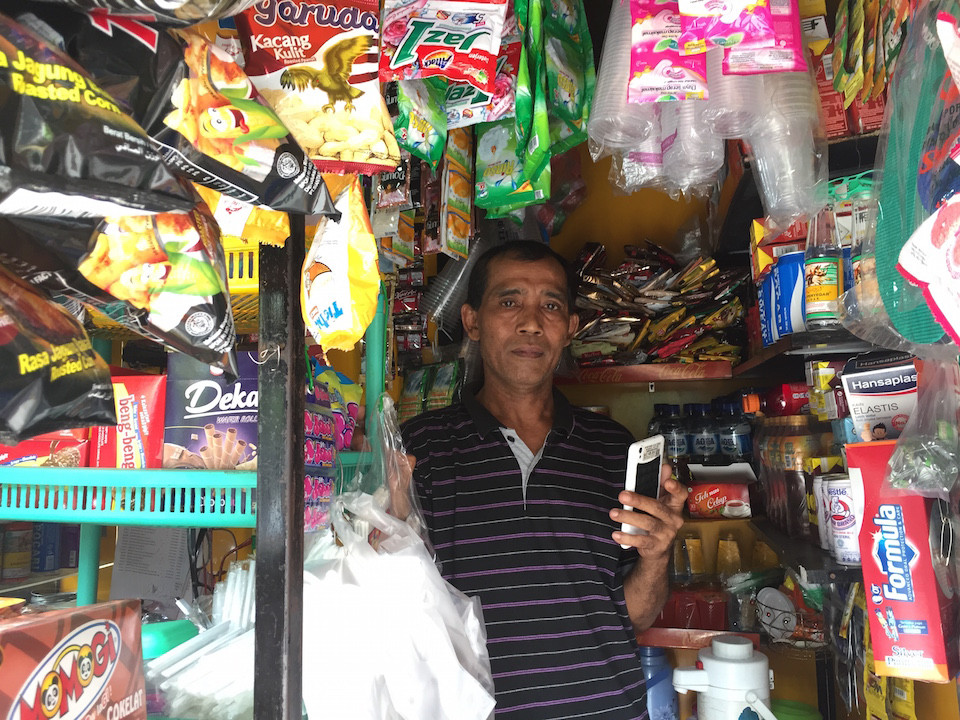Popular Reads
Top Results
Can't find what you're looking for?
View all search resultsPopular Reads
Top Results
Can't find what you're looking for?
View all search resultsAdaptability 'more useful' than math for microentrepreneurs: Study
According to a recent paper, fluid intelligence has a greater impact on a microentrepreneurs’ business profitability than “crystallized intelligence”, which can be understood as learned textbook knowledge such as math and science.
Change text size
Gift Premium Articles
to Anyone
Sulartono, 32, a Javanese man, has been a microentrepreneur in Jakarta for more than 10 years.
He began as a pushcart trader selling instant coffee, bottled tea and dried snacks, among other fast-moving consumer goods, in the Pulomas neighborhood in East Jakarta.
As of August last year he was still selling similar goods, but from a more high-tech warung pintar (smart stall) in the bustling Menteng neighborhood in Central Jakarta.
“My younger sibling owns a similar stall and it was he who told me about warung pintar,” he told The Jakarta Post recently.
His new stall, which he named Warung Pintar Elsa, features much more technology than his pushcart, such as WiFi, a tablet with built-in inventory software, a barcode scanner and on-demand supply delivery, which has made his work “much less tiring”.
His daily revenue also increased 43 percent since he abandoned the pushcart, with his income rising from a maximum of Rp 700,000 (US$49.60) each day to Rp 1 million.
Sulartono’s capacity to adapt to a smart stall is an example of what psychologists call “fluid intelligence”, which is an inherited cognitive ability to think logically and solve problems – Sulartono’s main problem having been stagnant revenue growth.
According to a recent paper, fluid intelligence has a greater impact on a microentrepreneurs’ business profitability than “crystallized intelligence”, which can be understood as learned textbook knowledge such as math and science.
The SMERU Research Institute working paper, for which more than 5,200 microentrepreneurs were surveyed, concluded that every 1-percent increase in fluid intelligence resulted in a 5.7-percent increase in profits and a 7-percent increase in business value.
“Why is fluid intelligence more impactful than math? Because it helps the entrepreneurs adapt to dynamic changes in the business and legal environment,” said SMERU researcher Veto Tyas Indro during a presentation about the results in Jakarta on Wednesday.
Adaptability is the key word.
Microenterprises such as Sulartono’s Warung Pintar Elsa are responsible for 37 percent of the gross domestic product (GDP) and employ 89 percent of the workforce, yet their business models have remained virtually unchanged over the past decade, greatly limiting their growth.
President Joko “Jokowi” Widodo even urged tech-savvy millennials several times last year to help these microentrepreneurs upgrade their businesses by either teaching them to use online marketing or do better branding.
Sulartono himself has adapted to Jakarta’s more digitized business environment by working with a warung pintar, which offers greater efficiency for the entrepreneurs and additional services for customers.
He not only learnt to use the stall’s tablet, barcode scanner and WiFi, but even invested in a smartphone to order supplies on-demand from warung pintar suppliers via WhatsApp.
“If I have to buy stock myself, it’s a waste of time, energy and transport costs. Now I can just order it online, then wait,” he said while waving his smartphone.
Veto also reasoned that mathematical knowledge was not as impactful on microentrepreneurs because complex calculations were unnecessary for such small business operations.
Warung Pintar Elsa, for example, has one employee, earns Rp 1 million every day and receives about 50 items in a weekly stock delivery. Sulartono does need any more mathematical knowledge to run the stall than he did the pushcart.
“Math is necessary but not at an advanced level,” said Veto.
However, he added that the limitation of fluid intelligence was that it was predetermined at birth. In other words, a person could not learn to become an adaptive problem-solver as he could learn math and science.
Therefore, Veto and his research team urged the government to invest more in maternal health care to maximize prenatal fluid-intelligence development and to create an employment system that identifies individual intelligence types, among other employability measures, to reduce labor force mismatch.
Ahmad Dading Gunadi, director for SME and cooperative development at the National Development Planning Agency (Bappenas), told the Post that the government has already implemented such policies.
“We have the Family Hope program, among other healthcare programs, and integrated public service centers,” he said.
The Family Hope program has been distributing annual conditional cash transfers of Rp 1.89 million to help pregnant and postnatal women in Indonesia’s poorest households since 2007.
However, the program was scaled back last year from serving 15 million to 10 million households while the cash transfers have been varied from Rp 500,000 to Rp 9.75 million depending on the number of dependents.
The 75 integrated public service centers built around central and western Indonesia (there are none in the eastern parts of the country) provide training services for cooperatives and micro, small and medium enterprises.
However, the centers do not sort entrepreneurs based on their intelligence types, although they do provide a list of doable businesses in their respective areas.
Dading acknowledged that Indonesia’s overall business ecosystem was "average for Southeast Asia” and, thus, the government would continue improving it.










